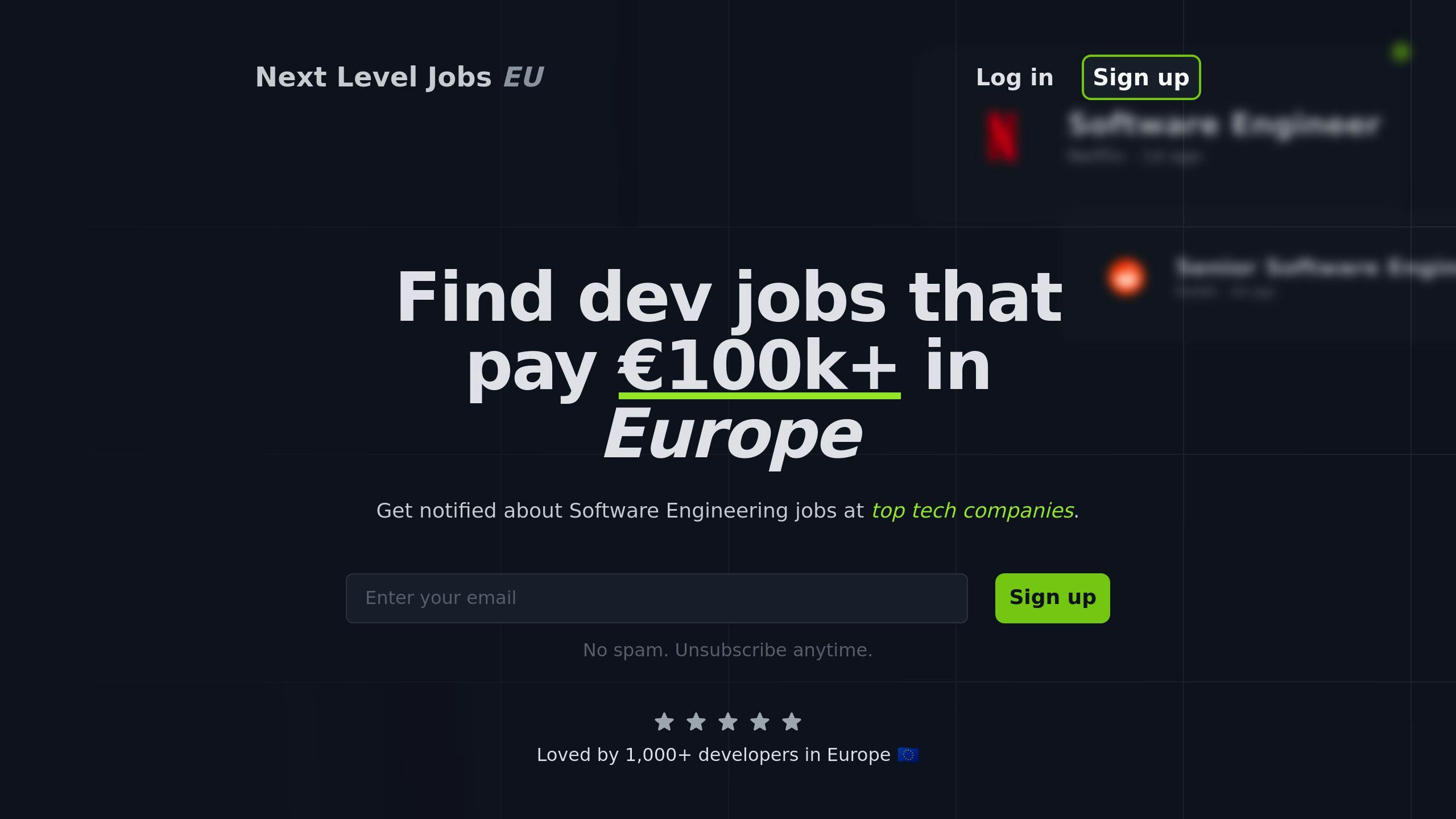Software Engineer
Netflix - 1d ago
Senior Software Engineer
Reddit - 4d ago
Data Privacy Laws Impacting Remote Work
All posts | Published Dec 16, 2024
Data Privacy Laws Impacting Remote Work
Remote work is heavily influenced by strict data privacy laws like GDPR in Europe. These regulations emphasize secure handling of personal data, transparency, and accountability, even for cross-border teams. Non-compliance risks fines of up to €20 million or 4% of global revenue. Here's what you need to know:
-
Key Rules for GDPR Compliance:
- Use encryption, VPNs, and secure cloud storage.
- Manage consent and restrict data access by roles.
- Report data breaches within 72 hours.
-
Challenges for Remote Teams:
- Cross-border data transfers need safeguards like SCCs.
- National laws, like Germany's BDSG, add complexity.
- Detailed documentation and impact assessments are required.
-
Steps for Better Security:
- Use GDPR-compliant tools.
- Train employees on privacy rules regularly.
- Monitor access and prepare for breaches with clear response plans.
With AI and data brokerage under increased scrutiny in 2024, staying updated on privacy laws is vital for remote teams. This article explains how to navigate these challenges while maintaining productivity.
GDPR Compliance: "Explain Like I'm Five" with Data Privacy Expert
Key Data Privacy Laws That Affect Remote Work
Data privacy laws in Europe, led by the General Data Protection Regulation (GDPR), have reshaped how companies handle remote work and sensitive data. Alongside GDPR, national regulations add layers of complexity, creating a challenging compliance environment for organizations managing remote teams across borders.
GDPR and Its Role in Remote Work
GDPR sets strict rules for managing personal data, especially in remote work scenarios. Companies must ensure secure handling of information while being transparent about data usage.
Here are some key GDPR requirements for remote teams:
| Requirement | Implementation Details |
|---|---|
| Data Security | Encryption, VPNs, secure storage |
| Consent Management | Clear consent for data use |
| Access Controls | Role-based restrictions |
| Breach Response | 72-hour breach reporting |
To stay compliant, organizations should rely on secure communication tools and cloud storage solutions that meet GDPR standards [1].
While GDPR provides a consistent framework, its application becomes more challenging when managing remote teams spread across multiple jurisdictions.
Navigating Cross-Border Privacy Challenges
Germany highlights the added complexity of cross-border compliance with its dual-layer system, combining GDPR with the Federal Data Protection Act (BDSG).
Some common challenges include:
- Data Transfer Restrictions: When transferring data internationally, safeguards like Standard Contractual Clauses (SCCs) are required [1].
- National-Level Variations: Many European countries enforce additional privacy laws beyond GDPR [2].
- Documentation Demands: Organizations must maintain detailed records of data processing activities and conduct Data Protection Impact Assessments (DPIAs) [1].
The Court of Justice of the European Union (CJEU) is expected to address key GDPR issues, including criteria for non-material damages and dataset anonymity [3]. These rulings will influence how remote teams approach data privacy, making it essential for companies to stay updated on legal changes.
Steps to Protect Data Privacy in Remote Teams
Remote software engineering teams face specific challenges when it comes to safeguarding data privacy. Putting strong security measures in place is a must for staying compliant with GDPR and protecting sensitive information.
Using Secure Tools to Safeguard Data
Tools like VPNs, encryption, and multi-factor authentication (MFA) are key to keeping remote work secure and blocking unauthorized access [1]. VPNs help ensure data is transmitted securely, while MFA and end-to-end encryption protect accounts and sensitive files. Secure file-sharing platforms also make it easier for teams to collaborate without compromising security.
While these tools are essential, cloud platforms also play a major role in meeting GDPR requirements.
Cloud Platforms and GDPR Compliance
Choosing the right cloud provider is critical. Look for providers that meet GDPR standards, offer strong encryption, and provide detailed monitoring features [1]. Important features to prioritize include:
- Logging capabilities for tracking activity
- Data residency within the EU
- Granular user permissions to control access
However, even the most advanced tools and platforms can't replace the importance of informed and vigilant employees.
Training Employees on Privacy Rules
Technology alone isn't enough. Employees need to understand GDPR and how to handle data securely to prevent breaches [1].
| Topic | Focus Areas | Recommended Frequency |
|---|---|---|
| GDPR Basics | Rights of data subjects, breach reporting | Quarterly |
| Phishing Prevention | Recognizing suspicious emails, avoiding social engineering | Monthly |
| Safe Data Handling | Secure file sharing, device protection | Bi-monthly |
| Incident Response | Steps for breach reporting and containment | Quarterly |
sbb-itb-1fbb62f
Guidelines for Remote Teams to Stay GDPR-Compliant
Setting Clear Rules for Data Access
Protecting sensitive information while enabling remote work requires a solid access management system. Role-Based Access Control (RBAC) ensures that employees can access only the data needed for their specific job roles.
| Access Level | Permissions | Audit Frequency |
|---|---|---|
| Administrator | Full system access with audit logging | Weekly |
| Team Lead | Department-specific data and team management | Bi-weekly |
| Developer | Development environment and relevant code repositories | Monthly |
| Support Staff | Customer data on a need-to-know basis | Monthly |
Once access controls are in place, ongoing monitoring becomes essential to detect and address potential risks.
Monitoring Data Use and Preparing for Breaches
Access controls reduce risks, but proactive monitoring is key to staying ahead of vulnerabilities. German organizations, governed by GDPR and the Federal Data Protection Act (BDSG), set an example for strong data protection measures [2].
Beyond standard tools like VPNs and encryption, remote teams should adopt advanced monitoring systems such as SIEM tools or endpoint detection platforms. These can help track:
- Unusual access patterns
- Large data transfers
- Access attempts during off-hours
- Repeated failed login attempts
To handle breaches effectively, teams need a well-defined incident response plan. This plan should outline steps for breach notification, containment, and resolution. Regular security audits can uncover weaknesses, allowing teams to address them before they escalate. All findings should be documented, and necessary updates implemented without delay.
These practices strengthen security while aligning with GDPR's accountability requirements. Using cloud services with integrated security features can add another layer of protection, ensuring secure yet accessible data for authorized users [1].
Finding GDPR-Compliant Remote Jobs with Platforms Like Next Level Jobs EU

Using Filters to Pinpoint Privacy-Focused Roles
Platforms like Next Level Jobs EU make it easier to find roles that align with GDPR standards. They offer filters for location, technology stack, and seniority level, helping candidates zero in on privacy-focused positions.
| Filter | Purpose | Benefit |
|---|---|---|
| Location | Find roles within EU jurisdictions | Ensures the role complies with GDPR guidelines |
| Technology Stack | Match positions using compliant tools | Aligns your skills with privacy-focused tech |
| Seniority Level | Target roles tied to data protection duties | Fits roles with privacy leadership needs |
Once you've identified potential roles, the next step is assessing how committed the organization is to data privacy.
Assessing Employers' Privacy Practices
With regulatory focus on data privacy increasing - especially in data brokerage and AI - it's essential to go beyond job descriptions and evaluate an employer's dedication to data protection [3].
Here’s what to focus on during your job search:
- Privacy Policy Transparency: Check if the company’s privacy policies are clear and detailed.
- Security Certifications: Look for certifications like ISO 27001 or similar standards that demonstrate a commitment to security.
- Data Protection Infrastructure: Identify whether the company has a Data Protection Officer and established frameworks to handle privacy concerns.
Next Level Jobs EU also provides tools to help candidates dig deeper into these areas:
| Assessment Area | What to Look For |
|---|---|
| Job Descriptions | Mentions of GDPR compliance and specific privacy practices |
| Company Profiles | Evidence of initiatives supporting data protection and security |
| Technology Stack | Use of tools and platforms that align with GDPR requirements |
| Remote Work Policies | Clear processes for managing data in distributed work settings |
Conclusion: Balancing Remote Work and Data Privacy
As remote work continues to grow, businesses face the challenge of balancing flexibility with strict data protection rules. With 2024 bringing heightened regulatory focus - especially on AI and data brokerage [3] - it's crucial for remote teams to keep their compliance strategies up-to-date and use tools designed with privacy in mind.
For software engineering teams, weaving data privacy into everyday tasks is key. This involves following secure coding standards, protecting repositories, and ensuring GDPR compliance across all workflows in distributed setups.
In regions like Germany, where the Federal Data Protection Act (BDSG) outlines specific rules [2], organizations need to focus on:
- Using secure, GDPR-compliant platforms
- Offering regular privacy training for employees
- Keeping detailed documentation and monitoring processes
- Staying prepared for changes in regulations
To succeed, these efforts must come together in a well-structured, privacy-first strategy. As discussed earlier, this requires both reliable technical solutions and active employee participation.
Software engineering teams face the dual challenge of staying GDPR-compliant while keeping their development processes efficient. With AI and data protection under the spotlight [3], these teams need to continuously refine their practices to stay compliant without sacrificing productivity.
Organizations that focus on compliance and adaptability will stand out in the evolving remote work environment, especially as data protection laws and privacy expectations continue to shift [1].
Related Posts
Guide to Relocating for a Tech Job in Europe
Remote vs. On-Site: Tech Jobs in Europe
10 Remote Developer Productivity Tips 2024
Remote Work Trends in European Tech
About Next Level Jobs EU
Next Level Jobs EU is a premium job board dedicated to connecting top talent with the highest paying companies in Europe.
We only list companies that can pay 100k+ for senior software engineers.